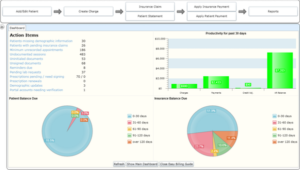From nuanced clinical documentation to intricate patient care plans, the demands of behavioral health services necessitate robust EMR software solutions.
The Importance of Specialized EMR for Behavioral Health
Behavioral health providers often manage complex cases that require detailed notes, treatment plans, and privacy considerations. A specialized EMR system is not just a nice-to-have; it’s a vital tool that supports the multifaceted nature of behavioral health care.
Tailored Clinical Documentation
Clinical documentation in behavioral health involves a delicate balance between comprehensiveness and confidentiality. Unlike general medical records, behavioral health notes must capture the nuances of mental health assessments, progress notes, and therapy sessions while adhering to strict privacy regulations. A specialized EMR system provides templates and customization options that align with the requirements of behavioral health documentation, ensuring that providers can capture the necessary details without compromising patient confidentiality.
EMR Software Integrated Patient Care Plans
Behavioral health treatment often involves a multi-disciplinary approach, including therapists, psychiatrists, social workers, and other specialists. An EMR system tailored for behavioral health allows for seamless integration of care plans, enabling different providers to collaborate effectively and maintain continuity of care. This integration ensures that all members of the care team are on the same page and that the patient receives holistic support.
Key Features of EMR Software for Behavioral Health Providers
When considering EMR software solutions for your behavioral health practice, there are specific features that you should look for to ensure that the system meets your unique needs.
Customizable Templates and Forms
Behavioral health encounters can vary significantly from patient to patient. The EMR system should offer customizable templates and forms that allow providers to document efficiently while capturing the individuality of each patient’s situation. This customization capability saves time and ensures that documentation is both thorough and relevant.
EMR Software Secure Messaging and Communication
Communication among healthcare providers, patients, and possibly their families is crucial in behavioral health. Secure messaging within the EMR software enables safe and HIPAA-compliant exchanges of information. This feature allows for quick consultations and updates without risking sensitive data exposure.
Robust Mental Health Billing Features
Billing for behavioral health services can be complicated due to the variety of services provided and the different billing codes used. An EMR solution with robust billing features tailored for behavioral health can simplify the process, reducing errors and streamlining claim submissions. This functionality leads to improved revenue cycle management and less administrative burden for the practice.
EMR Software Comprehensive Reporting and Analytics
Data-driven insights are invaluable in any healthcare setting, and behavioral health is no exception. EMR software that includes comprehensive reporting and analytics tools can help providers track outcomes, identify trends, and make informed decisions regarding patient care and practice management.
The Role of EMR in Supporting Compliance and Best Practices
Compliance with laws and regulations, such as HIPAA (Health Insurance Portability and Accountability Act), is non-negotiable for any healthcare provider. EMR software solutions for behavioral health must have robust security measures and compliance features to protect patient information and support best practices in clinical care.
Ensuring HIPAA Compliance
EMR software for behavioral health must be designed with security as a top priority. Encryption, access controls, and audit trails are critical components that help protect patient data and ensure compliance with HIPAA and other privacy laws.
Promoting Evidence-Based Treatment
Evidence-based treatment is the gold standard in healthcare, and behavioral health is no exception. EMR software can facilitate the implementation of evidence-based practices by providing access to the latest research, treatment modalities, and outcome measures. This support helps providers deliver the most effective care possible to their patients.
Choosing the Right EMR Software for Your Practice
Selecting the right EMR software for your behavioral health practice is a decision that should be made with careful consideration of your specific needs and objectives.
Assessing Your Practice’s Needs
Before diving into the vast market of EMR software, assess the specific needs of your practice. Consider factors such as the size of your practice, the types of services you offer, your workflow, and the needs of your patients. This assessment will help you identify the features that are most important for your practice.
Comparing EMR Software Solutions
Once you have a clear understanding of your needs, compare different EMR software solutions to find the one that best fits your practice. Look for systems that offer the key features we’ve discussed, and don’t hesitate to request demonstrations or trials to see the software in action.
Evaluating Customer Support and Training
Implementing a new EMR system can be a significant undertaking. Choose a software provider that offers comprehensive customer support and training to ensure a smooth transition for your practice. Adequate training ensures that your team is confident in using the new system, which is crucial for maximizing the benefits of the software.








